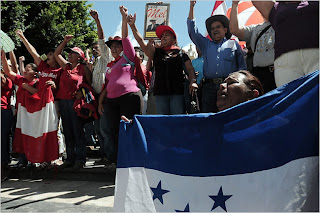
Monday, November 30, 2009
What Can We Do to Change the World

Culture, Crisis, and America's War on Terror


Monday, November 23, 2009
Can the War on Terror Be Won?

The Culture of National Security: Norms and Identity in World Politics

Power in International Politics

America's Imperial Ambition

Tuesday, November 17, 2009
Cosimo Cavallaro versus Bill Donoghue

The Real WW IV

He also cites 2 competing US interests in the MidEast: our increasing oil dependence and our alliance with Israel. He found that the legacy of the 1991 Gulf War had only increased US commitments to this war. Public support for the Iraq War following 9/11 was characterized by "self-induced historical amnesia" and uncritical attitudes toward military power.
Thursday, November 12, 2009
Plenary Session on the Relevance of the United Nations

U.N. Requires Fundamental Reforms

The Fog of War

Mexico City Journal: Where the Swearing Is All About the Context

Frontline: The Triumph of Evil
The triumph of evil is for good men to do nothing.
 (Left) During his three-hour stop in Rwanda, the President apologized for the international community's failure to stop the genocide that occurred in that country four years ago.
(Left) During his three-hour stop in Rwanda, the President apologized for the international community's failure to stop the genocide that occurred in that country four years ago.This Frontline Special followed up on the Rwandan genocide and the question of whether or not it is the obligation of Democratic nations to intervene in these events. Though the United States may have stated its desire to maintain their respect of state sovereignty as their reason for ignoring the events occuring in these nations, the Clinton administration simply had no interest in Rwandan affairs. There were no natural reasources they were gaining from this region that would make the country of any concern to the US, and so they allowed the genocide to occur, thinking that it would eventually sink into oblivion. But the massacre ended up being much more devastating than expected. Still, Clinton officials were too afraid to call the event a genocide, since many believed using strong words such as this may affect the outcome of upcoming congressional elections. When Clinton finally went to Rwanda to give his apologies for the lack of concern the international community had for the terror that occured in their nation, he used the word "genocide" eleven times.
Guest Speaker: Ted Spiker

Blackouts Plague Energy-Rich Venezuela

The Saturday Profile: Back From the Suburbs to Run a Patch of Somalia

(Left)"It was hard for my wife and kids. But I'm doing something big here, and they know that."
The tone of the article in the introductory paragraph of this article suggests that the author, Jeffrey Gettleman, finds the fact that a man from Minnesota was asked to rule a part of Somalia to be quite comical and ridiculous. He relies on the man's appearance, "oversiz[ed]", "wearing a golf cap, huge sunglasses, baggy jeans, and an iPhone on his hip", to describe him rather than his leadership skills. Gettleman even uses the phrase "mind-boggling" when describing the expectations of this man "who dresses and talks like a rapper". But, as the article goes on, it appears that Gettleman was only using this skepticism to surprise the reader, as Mr. Aden appears to have created more peace in this war-driven nation than any previous rulers. New businesses, rules, police force, and schools have been installed under his guidance. He is a strong believer in creating government from the bottom up, something Somali elders saw in his fast efforts in aiding in the recent Somali droughts, which ultimately led them to believe he would be the perfect ruler of their small providence. His only enemy are the pirates, whom Aden seems to believe he can fend off with a little help in resources.
*“We needed a man of peace and he is from a peaceful place, Minnesota,” said one elder, Mohamed Ali Farah. *
Just how Gettleman began his article out of humor, he ends it the same way. All the middle information is employed to defy the reader's assumptions, which were originally based on the use of his humor.
Thursday, November 5, 2009
Honduran Security Forces Accused of Abuse

The caption of the picture above read "A man lay wounded after a shot in the head during another rally in July." It looks more fatal to me.

The picture to the right is one of the most awkward photos I've ever seen. The guy looks like he's on the phone while everyone's getting bludgeoned and the caption reads that this was a "pro-Zelaya student demonstration", while most of these people look to be professors.
Ever since President Zelaya's exile, security forces have attempted to fend off protest by beating or arresting people found associated with any form of opposition. Eleven people have been killed since the coup took place on June 28th and how many injuries have been reported. Mr. Zelaya secretly returned to Honduras two weeks ago, taking refuge at the Brazilian Embassy.
People are fearing the upcoming elections more than ever. Will enough people vote following mass discomfort with how the last president was removed and will great powers like the United States choose to recognize the election as legitimate, or continue to support the ousted president?
Tuesday, November 3, 2009
Driven the Distraction: When Texting Kills, Britain Offers Path to Prison

Sunday, November 1, 2009
Deal Set to Restore Ousted Honduran President

In a Coup in Honduras, Ghosts of Past U.S. Policies
 This article can be found here.
This article can be found here. Forty Years War: A Place Where Cancer is the Norm

Guest Speaker: Mike Foley
 October 26, 2009
October 26, 2009